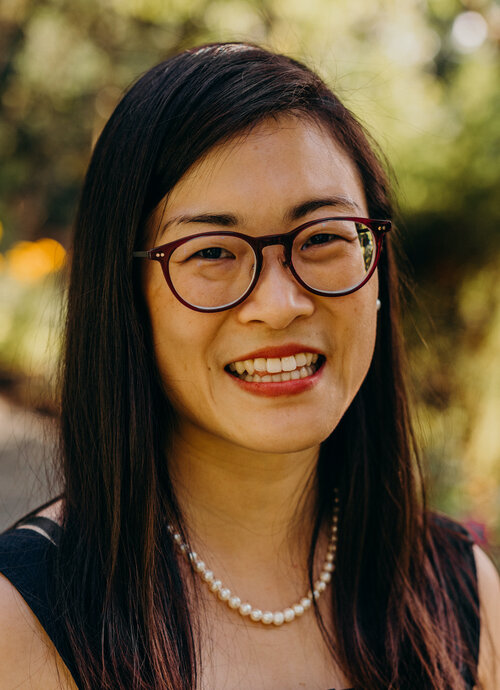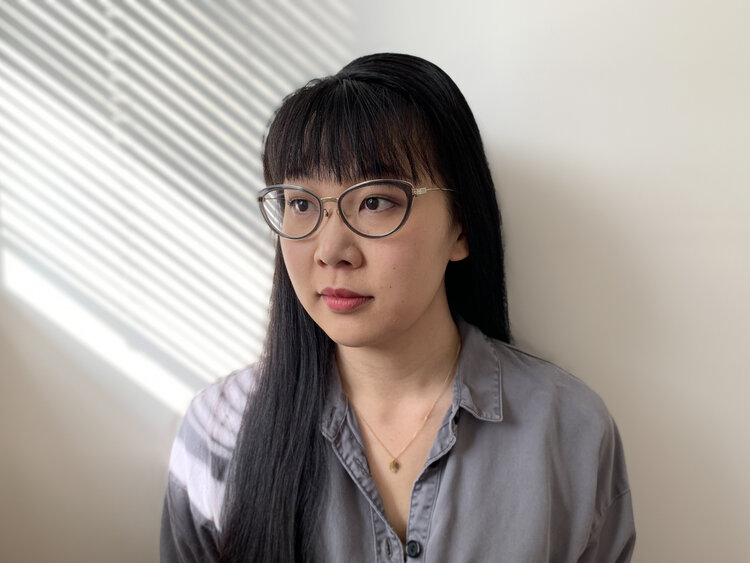Sheltering: Family Notebook
by Mia Ayumi Malhotra
for my daughters, with lines from Louise Glück
Ready or not, here we are. We’ve been lost and found,
gone underground. We’ve raised cardboard cities,
pounded flowers to pulp. Danced like seeds, sprouting.
We’ve been Stuck in the Mud, traced ourselves
in chalk, watched our bodies turn to brilliant dust.
Around us, the death toll rises. Something comes
into the world calling disorder, disorder—
Ordered home, we’re baking. My daughters peer
into the oven. I don’t know how much longer, I say—
lost, too, in this interminable landscape.
Somewhere in the desert, my great-grandfather lifts
a stone from a dry creek bed. Sui meaning water, seki
meaning stone—suiseki as in viewing stones, naturally
formed. For days, he contemplates its dimensions.
A desolate island, perhaps—blueprint of some past
or future grief.
How many times have we made life from dust?
First strawberries, then carnations. Roses, by trial
and error. Unearthed, we’ve found the white of bones,
wet of saliva, sound of singing—at the end
of my suffering there was a door.
One day we will reenter the house of the living.
A local store texts: OPEN NOW! FACE MASKS
AND GLOVES FOR SALE! My daughter chants rhymes,
writes her name for the first time. She’s learning
the names of things. Yeast. Virus. Oxalis. She calls it
the pandemonium.
Enculturation, they say, bringing a child into language—
from raw to cooked, pale and unformed to browned.
Friday, she kneads dough. Monday, she pushes stones
into place, forms the letter “Y.” We touch the rough,
chiseled edges and count the days.
Outside, fever rages. It’s spring. She picks flowers
with her sister, wild irises with gold veins,
bellflowers with red and yellow striations. Their bodies
—so beloved, I sometimes mistake one
for the other—climb into bed beside me.
The hours stretch. Dusk lengthens over the trees.
From my window, I can see the neighbors’
lit A-frame. I was once afraid—I still am, but every night
the sun sets, and in the gloaming, a star—or is it
the light from a plane—blinks on—
Previously Published in MiGoZine, “Year in Poems” (January 2021).
* Mass Poetry Writing Prompt: Consider the rhythms and routines that have shaped your life during the pandemic. Write about them, giving your poem a shape that mimics the ebb and flow. Is it a consistent pattern or one full of interruptions?
I am talking about joy
by Jessica Yuan
I mean how I may never learn from it
if there is always both yes and no
catching porous at the throat,
and if you do not see it also,
the underlying freedom,
smooth stone tiling the swimming floor, rough stone tiling the world
of these our summer years, spent a-hum one leaf then another,
wanting the biggest leaf in the world
with a long line of everyone
awaiting thanks and credit: god and history, inventors
of refrigerant, deodorant, management & parent, yes you
make up a part of it like everything else.
You are stained in the dish also
(and what is this culture
I am a part of?) Does each cilium know?
That the rest of it is a waste of praise—no praise for the institution,
no wasting of sunlight on the asphalt’s tar-heat—it must fall
upon the grass & leafy crown who make something of it,
praise must be thrown there, to the quivering strand
of life on its own work:
crushing
the slimes together, newnew smells, useful,
pinning up and taking their legs, eating tin (I can eat anything)
outgrowing our planting pots,
our hermit crabs and baby shoes
and do I need another pot? with no room on the terrace?
this terrace with its corners? to sweep
and muck under the Great Wheel of Time
cycling into its autumn, Cretaceous,
Hurricane My Name, October/February/July Revolution—
It takes a great deal to imagine
something other than that. Whatever we imagine now
must know the slope and soil. I cannot imagine
each doorway in the city where every
one of them knows and agrees.
I cannot draw up the map to that city
(we do not believe
in perfection, we are not sorry,
we laugh into our wrists)
Still it is your most fervent dream.
Still we can earn scraps of praise
from the dumpster’s opossum, the crabapple-drunk moose
(oh to be huge and wtf where we going)
still it will matter
at the city’s edge & further, where the snow hare must decide
whether to cower in meadow browns or winter whites.
I am not deciding. I am just telling you
how hard we all try.
* Writing Prompt: It’s hard to write about joy so let’s begin there— I invite you to write about joy and be prepared to go somewhere else entirely. Go towards the overwhelming, write about what is beneath or adjacent to joy, the underlying feeling, who sees your joy and whose joy you see, whose joy teaches you what. Wherever you end up writing, you are talking about joy.
This issue of The Hard Work of Hope is produced in partnership with Kundiman.

Mia Ayumi Malhotra
Mia Ayumi Malhotra is the author of Isako Isako, a California Book Award finalist and winner of the Alice James Award, the Nautilus Gold Award, a National Indie Excellence Award, and a Maine Literary Award. She recently received the Hawker Prize for Southeast Asian Poetry and the Singapore Poetry Prize, and her poems have appeared in numerous journals and anthologies, including The Yale Review, Indiana Review, and The World I Leave You: Asian American Poets on Faith & Spirit.

Jessica Yuan
Jessica Yuan is author of the chapbook Threshold Amnesia (2020), winner of the Yemassee Chapbook Contest. She has received fellowships from Kundiman and Miami Writer’s Institute, and her poems are published in Best New Poets, Tupelo Quarterly Review, jubilat, Boulevard, Ninth Letter, The Journal, and elsewhere. She holds a Masters in Architecture from Harvard and currently works as an architectural designer in Boston.
